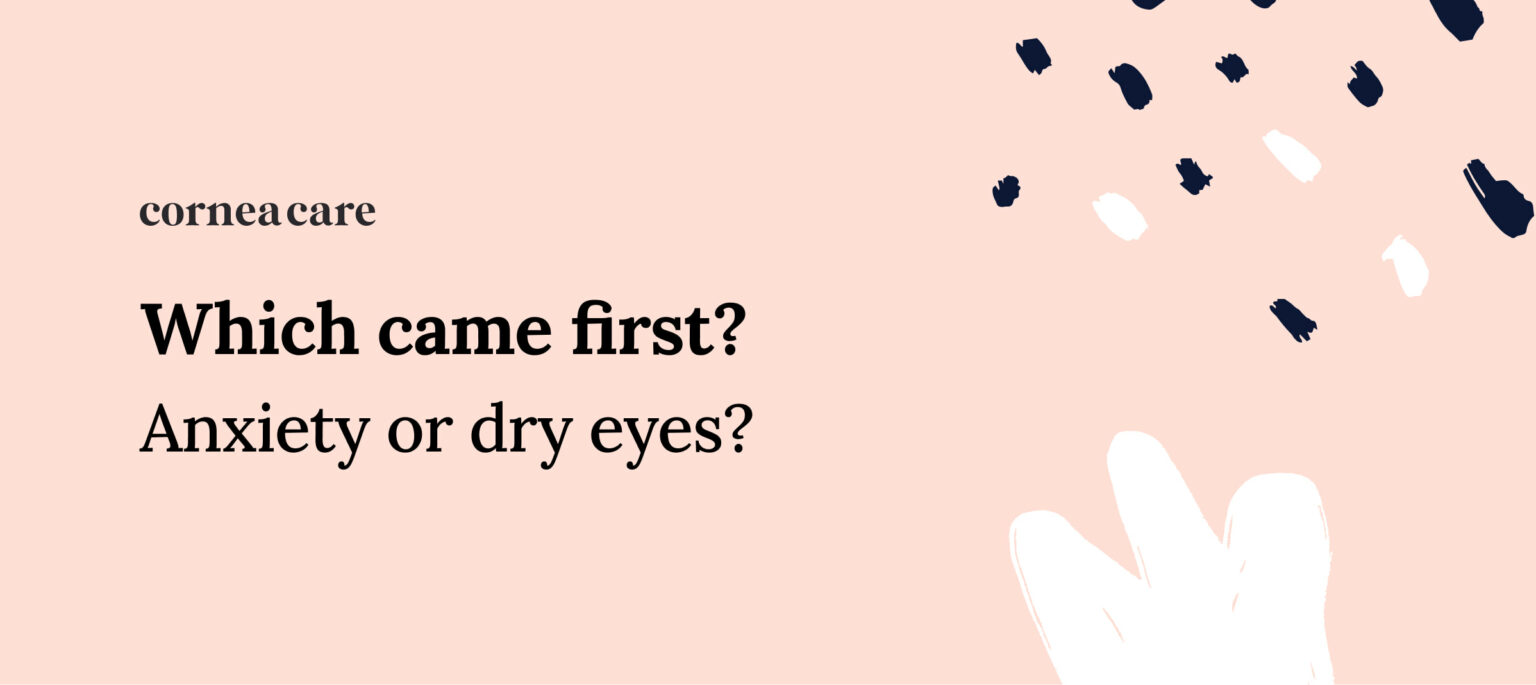Can Anxiety Cause Dry Eyes: Overview
If you are one of the over 30 million Americans who suffer from dry eye disease, you may wonder if anxiety has contributed to your symptoms. There is a strong link between mental health and dry eyes. Most people think of dry eyes as a disease that affects your eyes. While that’s true, it also affects the whole body, mind and soul of a person.
“People with dry eyes are 2-3 times more likely to have anxiety and depression,” says Ophthalmic Surgeon Jovi Boparai, MD. “In fact, treating dry eyes may actually help alleviate some anxiety and depression symptoms. Dry eyes can impact your physical and emotional wellbeing, so it’s a good idea to get on top of it!”
If you suffer from dry eye disease, you know how it can lead to feelings of anxiety. You may wonder what your eyes will feel like if you go out with friends or worry about losing your job because your dry eyes prevent you from doing your work. You may be anxious about the amount of money you spend caring for your eyes.
But is the inverse true as well? Can anxiety cause dry eyes? We explore this topic in-depth and look to the experts for answers.
Key Points
- Dry eye disease affects the mind and body.
- No studies show that anxiety causes dry eyes, but anecdotal and correlational data provide strong links between the two.
- Managing your dry eyes can have a positive impact on your mental health.
Keywords
Anxiety, depression, dry eye disease, eyelid hygiene, mental health
Taking the First Step
The good news is that if you’re concerned that anxiety is causing your dry eyes, you’ve taken the first step to finding relief. Education is key when it comes to dry eye disease. The more you know, the better equipped you are to control your dry eye symptoms.
Once you understand the physiological and lifestyle causes of dry eyes, you can start to explore what might be leading to your unique symptoms.
Then, along with your eye doctor (optometrist or ophthalmologist), you can develop a treatment plan to help you live your best life!
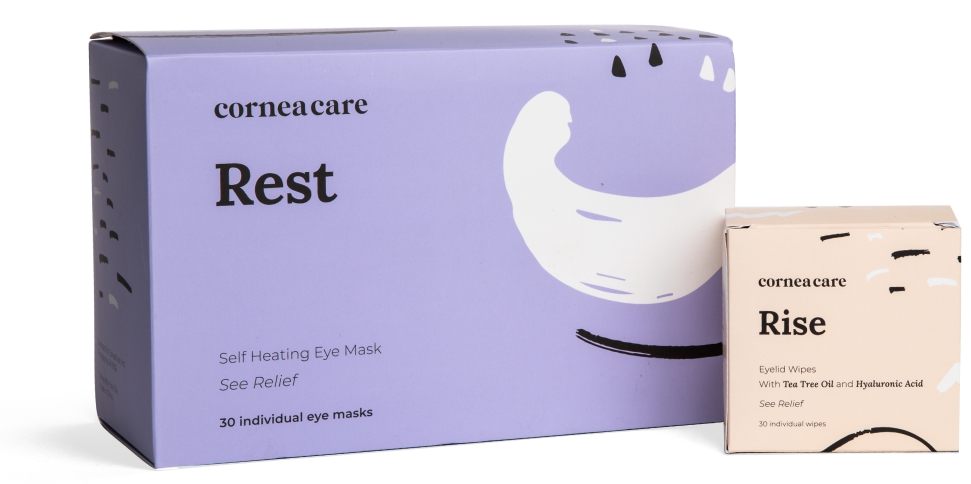
Foundation
Eyelid Hygiene Plan 2
Perfect for eye dryness, burning, itching, crusting/flaking of eyelashes and inflamed eyelids. Free shipping 📦.
Try today - $45
Understanding Dry Eye Disease
Dry eye disease (DED), also known as dry eye syndrome, keratoconjunctivitis sicca and ocular surface disease, is a chronic condition.¹
There are several causes of dry eyes, but for better understanding, we break them down into aqueous deficient DED (decreased tear production and secretion) and evaporative DED (rapid tear evaporation).
With aqueous deficient DED, your lacrimal glands (tear glands) do not produce enough tears to lubricate the surface of the eyes (the cornea and conjunctiva).²
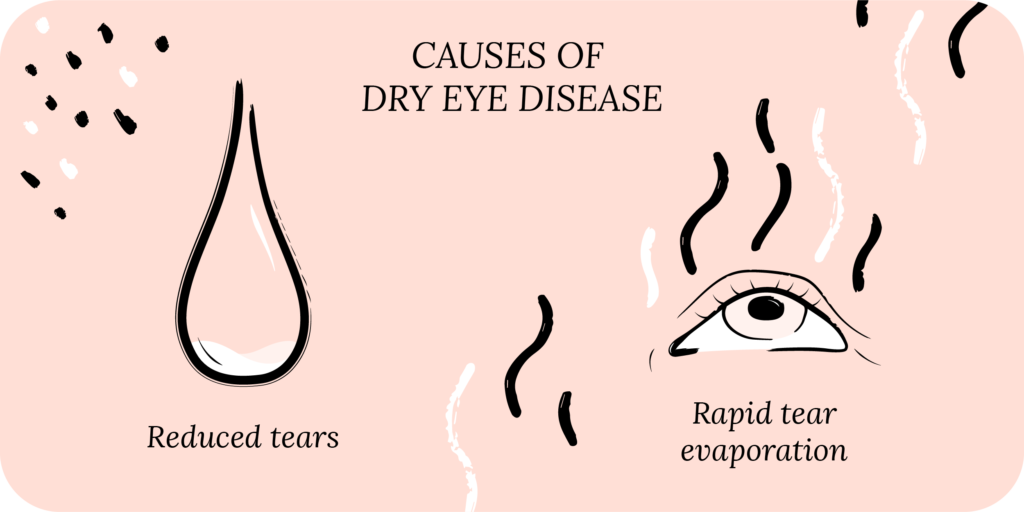
Aqueous deficient DED typically occurs with:²
- Autoimmune conditions (Primary Sjögren’s Syndrome and rheumatoid arthritis)
- Medical conditions (cancer and thyroid issues)
- Hormones (pregnancy and menopause)
- Oral medication side-effects (antihistamines, chemotherapy medication and antidepressants)
With evaporative DED, the eyes produce enough natural tears, but they evaporate too quickly because of unstable tear film (thin fluid layer covering the ocular surface)¹.
Eye doctors typically see this with:³
- Contact lens wearers
- Refractive eye surgeries (LASIK)
- Blepharitis (eyelid inflammation)
- Meibomian gland dysfunction (backed up oil glands in your eyelids)
- Other eye conditions (glaucoma)
Lifestyle and environmental risk factors also affect the development of DED. Living in a dry climate, smoking cigarettes (or exposure to cigarette smoke) and poor nutritional health can worsen dry eye symptoms.⁴ People who use digital screens for most of their day may experience a higher prevalence of DED as well.⁵
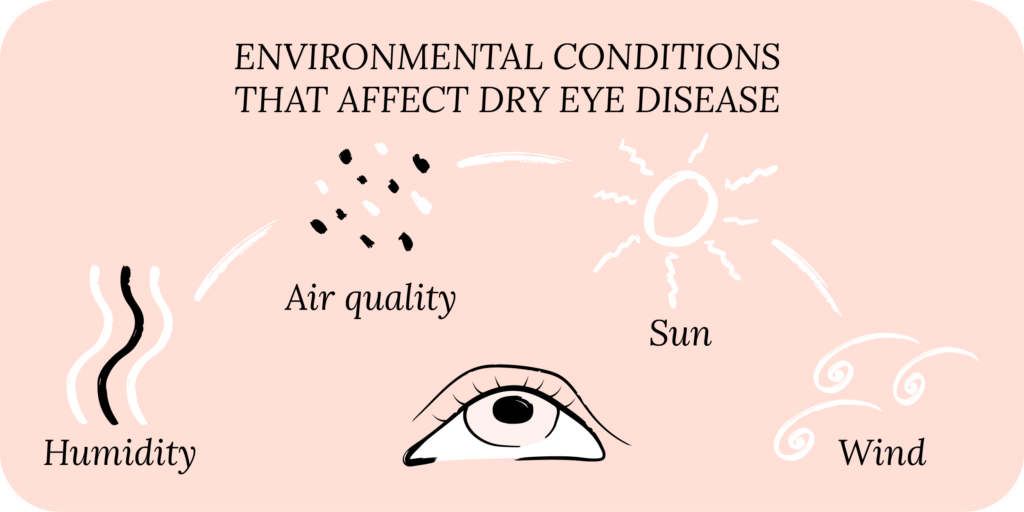
Symptoms of Dry Eye
Everyone experiences DED differently.
The common thread is that DED patients experience severe dry eye symptoms that interfere with their daily lives. Most people with DED have trouble performing daily tasks such as their work or household chores. Even leisure activities like watching a movie or reading a book can be challenging for someone with DED.
The most common dry eye signs and symptoms include:¹
- Redness
- Pain
- Burning sensation or stinging of the eyes
- Irritation
- Gritty sensation
- Foreign body sensation
- Dryness
- Blurry vision
- Excess watery eyes
- Light sensitivity
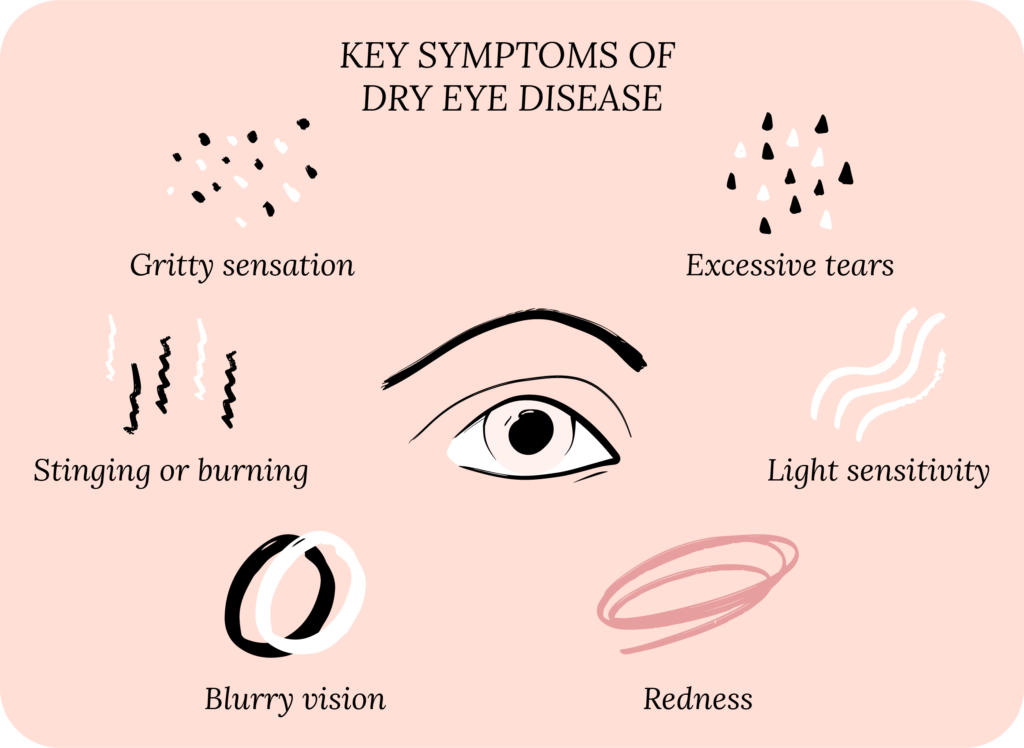
While DED does not cause blindness, it puts you at risk for other vision-threatening eye problems such as corneal abrasions, infections and scarring.
Diagnosing Dry Eye Disease is Difficult
One of the most frustrating aspects of DED is that it is difficult to diagnose.
DED patients may receive a normal eye exam and be sent on their way with recommendations for artificial tears to help lubricate the eyes. It may take months or even years to get a proper diagnosis, so educating yourself is key to helping manage your symptoms.
While there is no “cure” for DED, there are ways to manage symptoms (beyond just using eye drops).
If you suspect you have DED, advocate for yourself with your eye doctor (optometrist or ophthalmologist). Be specific about your dry eye symptoms and share them with your eye doctor. You may even consider keeping a dry eye diary to track your symptoms and flare-ups.
Make sure to share any other health problems, lifestyle habits, prior surgeries or eye conditions. You’ll want to mention any physical (like chronic pain) or psychological symptoms (like those associated with anxiety and depression), as these can help determine a treatment plan.⁶
After your eye doctor assesses your risk factors, they will analyze your symptoms using a specialized questionnaire (e.g., the Ocular Surface Disease Index (OSDI); the Standard Patient Evaluation of Dry Eye Questionnaire (SPEED); or the Dry Eye Questionnaire (DEQ). These questionnaires have limitations but provide data to give a diagnosis.⁷
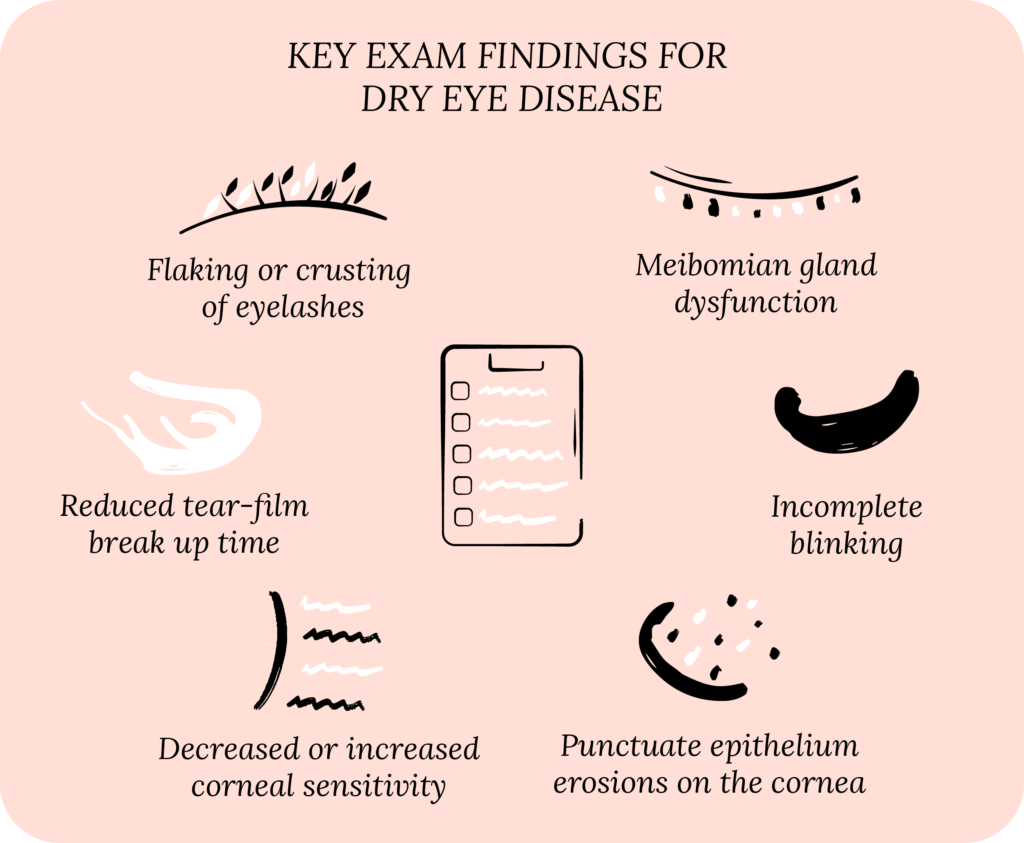
An eye doctor will also perform an exam to check your tear ducts and glands, eyelids, eyelashes and how your eyes blink. They may also test for aqueous deficient DED using the Schirmer’s test. An eye doctor will gently place a strip on the inside of your eyelid to measure your tear production (tear volume) over 5 minutes.⁸
Several new non-invasive imaging techniques are available, as are biomarkers tests to check for inflammation and the concentration of tears.⁹
The Intersection of Mental Health and Dry Eye Disease
As you’ve just learned, it can be difficult to diagnose dry eye disease because so many factors can contribute to symptoms. What eye doctors often miss during exams is the psychological toll.
If you have DED, you know that your symptoms go beyond just the eyes.
When you wake up in the morning with dry, gritty eyes, it is hard to get motivated for the day. You may fall behind on important tasks at work or school because your blurred vision and watery eyes prevent you from focusing. You may have trouble caring for your family because your eyes sting and ache and you are constantly applying eye drops. All of this inevitably impacts your quality of life and mental wellbeing.
Just know that you are not alone!
Our Community
Chat, share, and learn from our doctors, coaches and others like yourself
👩⚕️ Get answers!

Several cross-sectional studies have shown that anywhere from 25-50% of dry eye patients experience depression and 39–60% experience anxiety.¹º Before exploring this connection, let’s review some of the common signs of anxiety.
Anxiety Symptoms
Some people do not know that they have anxiety because they are so used to living with their feelings that their anxious state becomes their norm.
The physical symptoms of anxiety can include any of the following:¹¹
- Cold or sweaty hands
- Dry mouth
- Heart palpitations
- Nausea and digestive issues
- Numbness or tingling in hands or feet
- Muscle tension
- Shortness of breath
Psychological symptoms can include:¹¹
- Worrying, fears and panic
- General uneasiness
- Sleep disturbances
- Recurring thoughts of past events (traumatic or not)
- Trouble focusing
- Obsessive thoughts
Similar to the Beck Depression Inventory test to assess depressive symptoms, you can take a Beck Anxiety Inventory test to evaluate your level of anxiety symptoms. Your anxiety scores will give you an idea of the severity of your symptoms.
If you experience any of these symptoms and are concerned about your mental health, seek help immediately. You do not need to suffer alone.
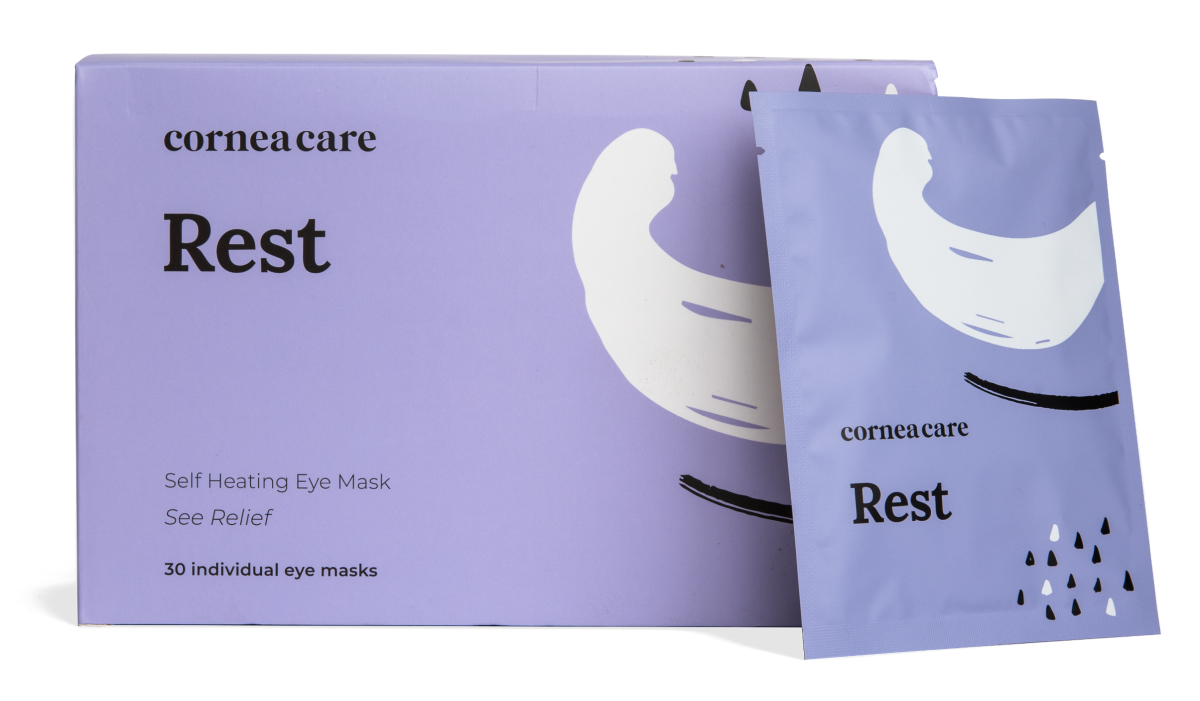
Rest
Warm Compresses
Perfect for eye dryness, fatigue, tearing, and puffiness of the eyelids. Free shipping 📦.
Try today - $30
How Anxiety Affects Dry Eyes
Just visit any online DED support group. It won’t take scrolling through more than a few posts to find one from a person expressing their mental health concerns.
There are no studies that show that anxiety/depression cause DED. Previous studies do, however, show a significant correlation between DED and anxiety.¹² In fact, a dry eye study of over 500 participants in Thailand proved that the incidence of DED and anxiety increased because of the Covid-19 lockdown measures.¹³ The study showed an increase in screen time correlating with anxiety and dry eye symptoms.¹³
Also, some antidepressants can dry out the eyes by disrupting the lacrimal glands and reducing tear production (specifically selective serotonin reuptake inhibitors and serotonin-norepinephrine reuptake inhibitors).¹⁴ These side effects of antidepressants lead some to think their anxiety or depression is causing their dry eyes.
These correlations are still important. They can help patients and specialists be on alert for symptoms of related conditions and help guide important treatment decisions.
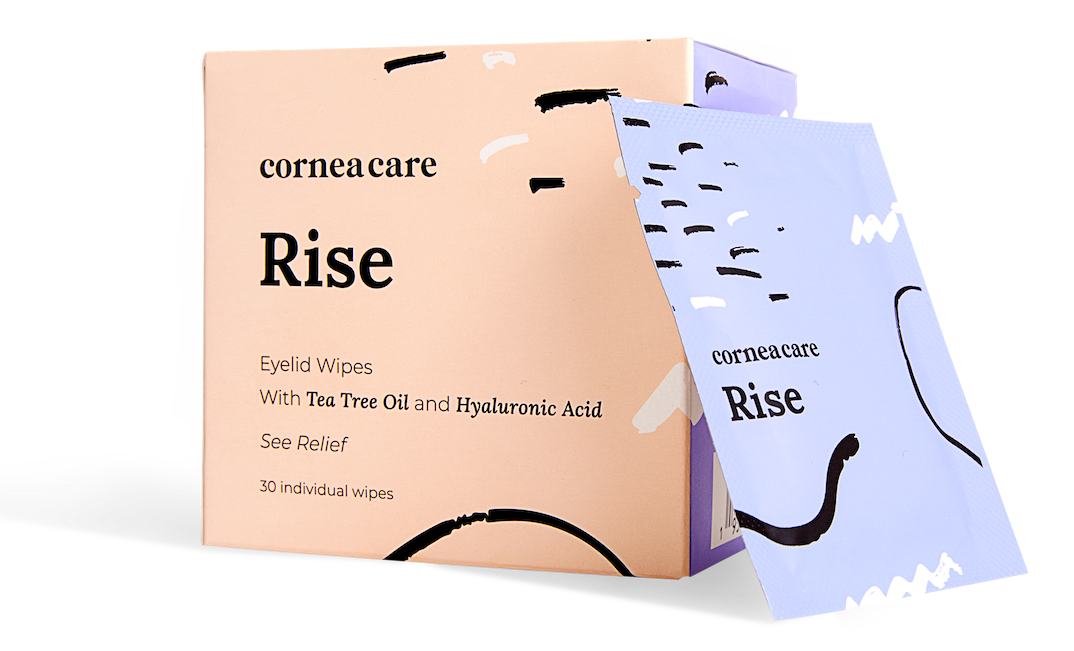
Rise
Eyelid Wipes
Perfect for eye dryness, itching, burning, and crusting/flaking of eyelashes. Free shipping 📦
Try today - $25
Dry Eye Treatment
No matter what is causing your dry eyes, we know you just want relief!
If you have anxiety, taking care of your mental health is important. You may notice that lifestyle changes that improve dry eye symptoms (like improving your nutrition, stress reduction, and less screen time) will also reduce your anxiety symptoms.
Dry eye treatment usually consists of lifestyle changes, lubrication with eye drops, and eyelid hygiene.
A simple eyelid hygiene routine could look like this:
- Wake up and use eyelid wipes to remove any buildup from clogged glands or excess tearing.
- Use a cold compress to reduce inflammation and soothe your dry eyes throughout the day.
- Unwind at the end of the day by using a warm compress before bed.
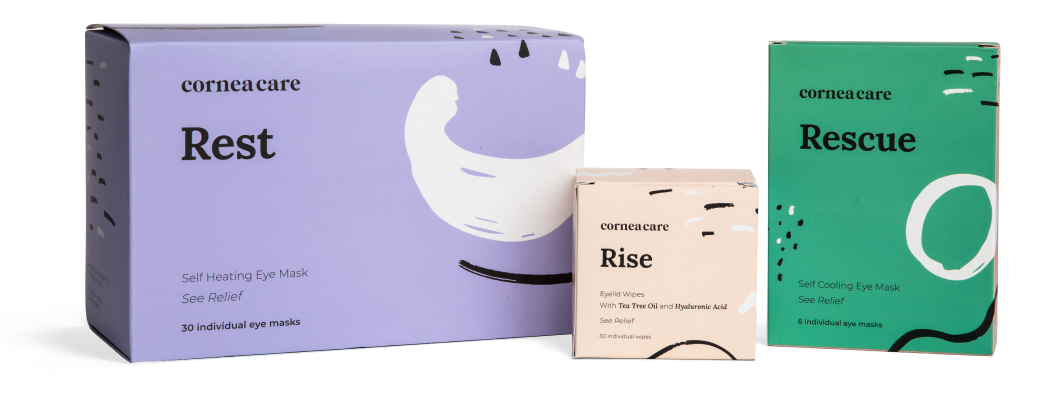
All Rounder
Eyelid Hygiene Plan 3
Perfect for eye dryness, burning, itching, grittiness, crusting/flaking of eyelashes and inflamed/swollen eyelids. Free shipping 📦.
Try today - $60
Depending on the severity of dry eye, a person may require prescription eye drops and in-office ophthalmic procedures.
Putting It All Together
Dry eye disease affects a person’s entire mind, body, and soul.
While anxiety may not cause dry eyes directly, taking care of your mental health can positively impact the way you feel overall. By practicing self-care, treating and nourishing your eyes, and working with your healthcare providers, you can get back to doing what’s important to you.
You are stronger than your dry eyes!
What’s Next
Take a deeper dive into dry eye disease with CorneaCare’s Dry Eye 101 Course.


